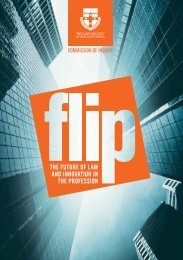Legal Mosaic Essays on Legal Delivery
1Tx15vb
1Tx15vb
Create successful ePaper yourself
Turn your PDF publications into a flip-book with our unique Google optimized e-Paper software.
<str<strong>on</strong>g>Legal</str<strong>on</strong>g> <str<strong>on</strong>g>Mosaic</str<strong>on</strong>g>: <str<strong>on</strong>g>Essays</str<strong>on</strong>g> <strong>on</strong> <str<strong>on</strong>g>Legal</str<strong>on</strong>g> <strong>Delivery</strong><br />
Put another way, disaggregati<strong>on</strong> has greatly pared down the number of<br />
tasks that require—or are perceived to require—a lawyer performing<br />
them in a law firm structure.<br />
The BigFour cannot (yet) set up legal shop as a law firm in the US<br />
(though they could certainly establish affiliate US firms c<strong>on</strong>nected to<br />
their UK and Asian bases) because of the current regulatory scheme.<br />
But that does not mean that they cannot—and do not—have robust legal<br />
c<strong>on</strong>sultancy practices in the States. And c<strong>on</strong>sider this: if you were<br />
to compare the practice areas those c<strong>on</strong>sultancy practices engage in<br />
and hold them up side-by-side to AmLaw 100 firms, you would be<br />
hard-pressed to tell the difference. What is the difference? It is often<br />
nothing more than: (1) a disclaimer that the c<strong>on</strong>sultancy is “not engaged<br />
in the practice of law”; and (2) risk is retained in both instances<br />
(though not emanating from “legal practice), but in the event of liability,<br />
the claim against the c<strong>on</strong>sultancy would be covered by an errors<br />
and omissi<strong>on</strong>s rather than a legal malpractice policy. This means that:<br />
(1) in a functi<strong>on</strong>al sense, the BigFour already have robust “legal c<strong>on</strong>sulting<br />
practices” in the US, even if they do not deliver those “legal”<br />
services in the guise of a law firm; and (2) it will be a virtually seamless<br />
transiti<strong>on</strong> for the BigFour into the full-blown practice of law <strong>on</strong>ce US<br />
regulators wake up to realize that the rest of the world’s legal market is<br />
moving in another directi<strong>on</strong>.<br />
Are Semantics Creating a False Sense of Security for Law Firms?<br />
The BigFour have already made deep, broad, and ec<strong>on</strong>omically significant<br />
inroads into the global legal market. And that includes the US<br />
where, as has been noted, for regulatory reas<strong>on</strong>s, it is labeled as “c<strong>on</strong>sulting”<br />
rather than “the practice of law.” This begs the questi<strong>on</strong>: is<br />
it any l<strong>on</strong>ger relevant to use “engaging in the practice of law” as the<br />
Maginot line to describe the delivery of legal services? And is it useful—as<br />
law firm lawyers do-- to segregate legal issues from broader<br />
66



